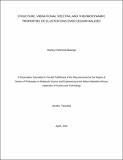| dc.description.abstract | The geometrical parameters, vibrational spectra and thermodynamic properties of molecular and ionic clusters of cesium halides, CsnXn, Cs+(CsX)n, X–(CsX)n, where X = F, Cl, Br, I, n=1-4, have been studied using electron density functional theory (DFT) with the Beck‒Lee‒Yang‒Parr functional (B3LYP5) and second and fourth order Møller‒Plesset perturbation theory (MP2 and MP4). The relativistic effective core potential (ECP) with Def2-QZVP for cesium and SDB-aug-cc-pVTZ for bromine and iodine, as well as full-electron basis set with aug-ccpVTZ for fluorine and cc-pVTZ for chlorine were employed. Geometrical parameters of the species have been optimized and vibrational spectra calculated. The IR spectra have been analyzed and assignment of vibrational modes performed. Various configurations of the species have been considered and existence of isomers revealed for trimers (Cs3X3), pentaatomic ions (Cs3X2+ and Cs2X3–) and heptaatomic positive ions (Cs4F3+, Cs4Cl3+). Using thermodynamic approach the relative abundances of isomers have been evaluated. Enthalpies of dissociation reactions ΔrH°(0) of molecular and ionic clusters have been determined theoretically and on the basis of the experimental equilibrium constants measured earlier for selected reactions. Both theoretical and based on experiment values of ΔrH°(0) appeared to be in agreement. The enthalpies of formation ΔfH°(0) of the species have been determined (in kJ mol–1): −1384 ± 8 (Cs3F3); −996 ± 9 (Cs3Cl3); −858 ± 11 (Cs3Br3); −698 ± 15 (Cs3I3); −1949 ± 13 (Cs4F4); −1453 ± 16 (Cs4Cl4); −1265 ± 23 (Cs4Br4); −1038 ± 23 (Cs4I4); −97 ± 4 (Cs2F+); 101 ± 5 (Cs2Br+); 160 ± 10 (Cs2I+); −774 ± 4 (CsF2−); −552 ± 5 (CsBr2−);−478 ± 10 (CsI2−); −581 ± 7 (Cs3F2+), 202 ± 10 (Cs3Br2+); −88 ± 15 (Cs3I2+); −1255 ± 7 (Cs2F3−); −858 ± 10 (Cs2Br3−); −729 ± 15 (Cs2I3−); −1142 ± 12 (Cs4F3+); −727 ± 17 (Cs4Cl3+); −1632 ± 17 (Cs5F4+); −1119 ± 36 (Cs5Cl4+). The Gibbs free energies ΔrG°(T) calculated for the dissociation reactions of trimer and tetramer molecules have indicated that these molecules are resistive in narrow temperature range only and decompose spontaneously with temperature increase with elimination of dimer molecules. | en_US |

